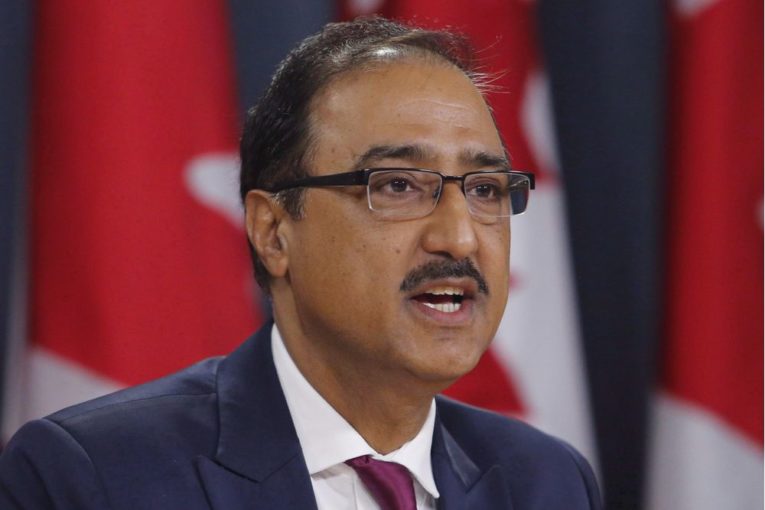
Less than 48 hours before a monumental legal decision on the Trans Mountain pipeline, federal Natural Resources Minister Amarjeet Sohi sat back in a chair at a Calgary coffee shop, feeling confident.
He wasn’t boldly predicting what the court would rule Thursday on the pipeline’s expansion project.
But he was self-assured Ottawa had done adequate work communicating with Indigenous communities about a project the federal government deemed was in the national interest — one it formally bought Thursday for $4.5 billion.
“We are very confident that we have done extensive consultation. We went beyond what the NEB has done. We took six months extra to consult with Indigenous communities and affected communities on the route,” Sohi said Tuesday.
“I think that puts us in a very strong position.”
That strong position crumbled like a sandcastle Thursday as the legal tide came in on the Trans Mountain expansion project, leaving a giant mess behind.
In a surprising decision, the Federal Court of Appeal nullified the permit for the $7.4-billion project on two grounds: inadequate consultation with Indigenous communities and improper consideration of oil tanker traffic tied to the pipeline’s expansion.
On Friday, the National Energy Board ordered construction work on the development to stop in the wake of the landmark ruling.
For Alberta, it’s not just that the minister was wrong that’s noteworthy — many others were as well — but it’s the broader question of what comes next for Canada’s energy industry?
When the federal government added an extra process onto the project’s regulatory review, designed specifically to increase Indigenous engagement, many onlookers — including myself — thought that would meet the consultation litmus test.
It didn’t.
“Canada was required to do more than receive and understand the concerns of the Indigenous applicants. Canada was required to engage in a considered, meaningful two-way dialogue,” Justice Eleanor Dawson wrote in the ruling.
“Meaningful dialogue required someone representing Canada empowered to do more than take notes.”
In other words, Ottawa messed it up.
Back in 2016, after the Federal Court of Appeal also determined there was inadequate consultation with Indigenous communities surrounding the Northern Gateway project — overturning the Harper government’s approval of it — one would have thought a proper roadmap existed for the feds and NEB to follow.
And while the issue of marine safety was discussed within the National Energy Board’s report on Trans Mountain, the process wasn’t deemed to be proper, creating a “critical error” that rendered the report fatally flawed, according to the court.
All of this leads to a couple of conclusions.
With the previous demise of Energy East and Northern Gateway, Canada’s energy sector still needs new pipelines to be built.
The Trans Mountain expansion will help diversify Canada’s customer base as oilsands production grows, and it should shrink the price discount facing Western Canadian heavy crude.
But that only happens if it’s built.
“We are sitting here thinking, what more needs to be done here? But this points out a really big problem — it’s another kick in the pants for the industry and Canada’s competitiveness,” said Chris Bloomer, CEO of the Canadian Energy Pipeline Association.
“The government now — because they both own the project and own the process — they need to look at how they’re going to address the issue.”
As in the Northern Gateway court decision, it’s worth pointing out the fatal mistakes here weren’t made by the companies or the affected communities on either side of the pipeline divide.
The fault lies squarely in the hands of federal governments, which have made the regulatory process so excessively complicated and cumbersome that no one — including the government itself — is apparently able to get a project in the national interest across the finish line.
For Alberta and the country’s oil sector, it’s a demoralizing setback.
“It’s frustrating for the upstream sector, (which) is missing out on investments in Canada,” said Tim McMillan, CEO of the Canadian Association of Petroleum Producers.
“What we want is a clear understandable process in Canada that is simpler than what we have now.”
Thursday’s court decision will not only delay the pipeline expansion — likely driving up its final price tag, if Ottawa can resolve the outstanding problems — it will also impact the price discount facing Canadian oil in the months ahead, depriving governments and producers of additional revenue.
Finally, the failure will affect how companies think about future investment decisions in Canada.
McMillan points out the lack of adequate market access is already affecting capital spending plans being made by producers. Oilpatch spending is falling in the country this year, but rising in the United States.
Why would an energy or mining company make a major capital investment in this country — spending billions of dollars and years of time — without more certainty the regulator has the powers and processes in place to make an enforceable decision.
“It’s like the pipeline debate has cast a pall on the entire oil and gas industry,” said Peter Tertzakian, executive director of the ARC Energy Research Institute.
“We amplify this very polarizing yes-or-no issue to the point of where it reflects poorly on the investability of the country as a whole. And that’s not an exaggeration.”
No one should be feeling confident today about Canada’s energy regulatory system, least of all the federal government.
With this week’s ruling, the Trans Mountain expansion project still remains a pipe dream for both Alberta and the Canadian oilpatch.
Chris Varcoe is a Calgary Herald columnist.
You can read more of the news on source
